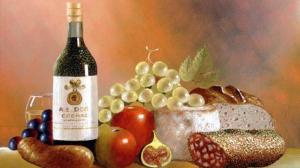Exactly 200 years ago today, on 7 May 1824 at 7pm Vienna time, Beethoven presented a “Grand Musical Academy” at the Theater am Kärntnertor. On the program: the Overture to The Consecration of the House; selections from the recently premiered (in St. Petersburg) Missa Solemnis (Kyrie, Credo, and Agnus Dei); and “a grand symphony with solo and choral voices entering in the finale, on Schiller’s ‘Ode to Joy'” — as the poster described the Symphony No. 9 in D minor, Op. 125.
From The Ninth: Beethoven and the World in 1824 by the always insightful cultural historian Harvey Sachs:
It was in the works of his last years that Beethoven delved ever more deeply into his subconscious while affirming ever more strenuously the artist’s obligation to use self-revelation as a means toward the achievement of worldwide human harmony. I call this process the universalizing of the intimate. His Missa Solemnis, Ninth Symphony, last three piano sonatas, “Diabelli” Variations for piano, and last five string quartets are above all a search for transcendence. In them, he carried the process of universalizing the intimate as far as and probably farther than any other musician had or has ever done; at the very least — as Maynard Solomon, a lifelong student of the composer’s life and works, has written — in these works Beethoven “forever enlarged the sphere of human experience available to the creative imagination.”
“The question of whether or not we ought to read artists’ lives into their works ceases to matter in Beethoven’s last years. His late works were his life. …”
“In many ways, Beethoven was — is – much more modern than we are. “We live ‘as if,’” says the protagonist of Claire Messud’s novel, The Last Life, “as if we knew why, as if it made sense, as if in living this way we could banish the question and the ‘as if’ness itself, the way we speak and act as if our words could be comprehended […].” Beethoven, in his terrifying isolation and his terrible pride and his unsurpassed capacity to transform experience into organized sound-complexities, went beyond that stage. In the last quartets, and certainly in the Ninth Symphony, he obliterated the ‘as if’ness of comprehension, and then went on to obliterate obliteration — to dance on obliteration’s ashes.”
Filed under: Beethoven, cultural criticism, cultural history

